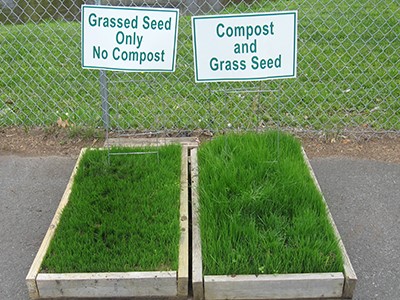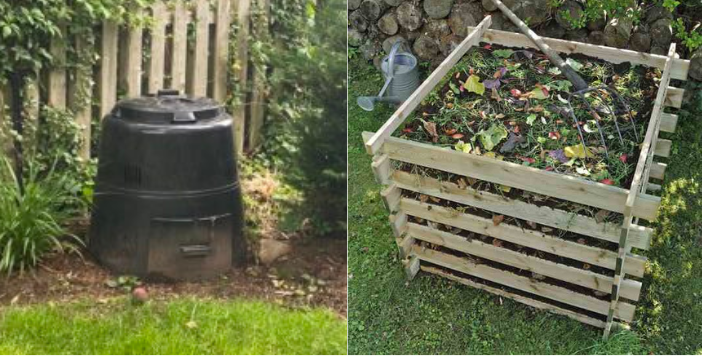Outdoor Composting
2025 Compost Bin and Rain Barrel Sale
Clean Water for Kane and Kane County Recycles are again teaming up with local non-profit The Conservation Foundation to offer low-cost rain barrels, compost bins, and accessories. 55-gallon rain barrels from Upcycle Products are available starting at $69.50 and composters are available in limited quantities starting at $75.50. All products are made in Illinois from re-purposed olive and pickle barrels!
Step 1: Browse and order products online (or download a mail-in order form) on this site. The deadline for online orders is May 27 (mail-in is May 22)
Step 2: Pick up your order at our collection event, Thursday, May 29, 3 - 6pm, at Creek Bend Nature Center, LeRoy Oaks Forest Preserve, 37W700 Dean St., St. Charles, IL 60175
Why Compost at Home or Work?
It’s earth-friendly: Food scraps and yard waste make up the largest portion of the waste stream. Making compost keeps these materials out of landfills, where they take up precious space and release methane, a greenhouse gas 21 times more potent than carbon dioxide, into the atmosphere.
It benefits your yard: Compost improves soil structure and texture, increases the soil’s ability to hold both water and air, improves soil fertility, and stimulates healthy root development in plants.

It’s easy: You can start with just leaves and grass, then work your way towards composting your food scraps.
It saves money: Adding compost to your garden can reduce or eliminate the need to buy chemical fertilizers or compost. If you pay for yard waste collection bags or stickers, composting can cut your costs.
How to Get Started?
Make a Plan - How and where will compostable materials be collected inside the home or workplace? How and how often will they be transported to the compost location? Where will the compost location be? (Hint: it should be outdoors, in partial to full sun). What type of composter or containment structure will be used?
Buy or Build a Container or Structure -Fully enclosed composters can speed up the decomposition process somewhat. They also prevent wildlife foraging and contain odors. Some composters tumble, making turning easy. Others require manual turning. Enclosed composters have a limited capacity, and may not be able to hold as much as you want to compost! You will likely also have to add water to enclosed composters on a regular basis during the summer to stop the material from drying out. Open-air containers can be one or a series of open-top bins. They can be purchased or built from lumber, chicken wire, or other fencing materials. They let dew and rain in, keeping moisture levels up. However, odor and wildlife can be a problem if food scraps are left near the surface. They also produce compost a bit more slowly, especially if not in full sun.

Enclosed composters and open containers have different benefits and maintenance considerations.
Start Your Compost with a Good Mix of Browns, Greens & Garden Soil - In the compost world, browns are carbon rich materials including fallen dead leaves, twigs, woodchips, bark, corrugated cardboard, paper, and starchy food scraps like bread and pasta. Greens are living plant materials like grass, flowers and other plant clippings. Greens also include most of your home kitchen material, including vegetable peels and other scraps, fruit peels and cores, coffee grounds, tea bags, etc. When you build your compost for the first time, but down a layer of browns, then a thinner layer of greens (the ratio should be at least twice as much brown as green - even more brown if possible). Then put in a couple of shovels full of soil. This introduces beneficial soil bacteria and engineers like earth worms to the compost. Then continue to layer browns, greens, and scoops of soil until you're out of material.
Only Compost the Right Materials - Home compost heaps should be limited to yard waste (cut up into pieces no larger than an adult hand if possible), plant-based table scraps, cardboard (cut into small pieces if possible), paper goods, egg shells, coffee grounds, tea bags, and cooked foods that don't contain dairy, meat, or a lot of fat. Some plant-based liquids like unwanted juice and tea are okay too. Meat, dairy, bones, plant fats and oils, and pet waste should not be put in home compost. Compost on this type of scale does not get reliably hot enough to kill the dangerous bacteria in meat, dairy or pet waste, and piles containing these items tend to smell very bad very quickly. Oil and grease in the compost prevents good air circulation. We also don't recommend including any packaging material marked "compostable" unless it is just cardboard. Again, the pile is unlikely to be hot enough to break down compostable plastics. Also, check food scraps for produce stickers and remove them, or those will end up in your finished compost! The same goes for packing tape and plastic labels on cardboard boxes.
Maintain the Pile - Maintenance involves keeping a good mix of browns and greens, with more browns than greens. This might take some planning! Compost piles should also be turned or mixed frequently - weekly if possible - during the growing season to keep air flowing and decomposition moving quickly. Water should be added to the pile in times of drought, and on a regular basis for fully enclosed composters.
Use Compost! - Compost is "finished" when it is dark brown to black in color (about the same color as wet coffee grounds, is fine and spoil-like in consistency, and has very little odor. Finished compost tends to accumulate at the bottom of bins first. There are lots of uses for compost! It can be used to top-dress lawns and garden beds. With a lawn, distribute a few small piles here and there and then rake them into the turf. With an existing flower or veggie bed, place compost next to the soil and under any hardwood mulch being used. For a new flower or veggie bed, or for any pots or containers, mix compost into the soil before planting. If you ever find yourself in need of more compost than you have, check out one of the many commercial compost facilities in the area to get a bulk delivery!
Resources
Illinois Food Scrap and Composting Coalition - Composting at Home
The Morton Arboretum - Composting
The Conservation Foundation - How to Make Compost at Home
U.S. EPA - Composting at Home
NPR Life Kit - Start Composting in 5 Easy Steps